In this Article
- Video: 11 Months Old Baby Milestones
- 11 Month Old Baby Milestone Chart
- What Milestones Baby Should Reach by 11 Months of Age?
- Physical and Motor Skills
- Cognitive Development
- Social and Emotional Development
- Communication Skills
- Eating Milestones
- When to be Worried
- Ways to Help Your Child Reach the Milestones
With a new baby, there is always a time of firsts. You will remember the first time your baby tried to sit, the first time he ate an entire meal on his own, and the time he stood up and walked with the support of course. But as your baby’s first birthday is approaching, you will probably be curious about what to look for so that you don’t miss any of those much awaited and much treasured moments in your lives.
Video: 11 Months Old Baby Milestones
11 Month Old Baby Milestone Chart
| Achieved Milestones | Emerging Milestones |
| He would be able to walk around the room while using support from your hand. | Might let go of your hand and walk independently. In some cases, you might find him trying to scale the furniture. |
| He should be able to use his fingers to put block toys together. | His usage of fingers would only get better and would start performing complex functions like eating with a spoon. |
| He will have moved on to solid foods such as fruits, meat and dairy products. | He will soon develop his own taste and preferences. This means he may not always eat what is offered to him. |
| He will be able to speak certain words like Yes and No. | He is yet to master speech and over time will be able to give coherent replies to your questions. |
Source: https://www.webmd.com/parenting/baby/baby-development-11-month-old#1
What Milestones Baby Should Reach by 11 Months of Age?
The development of a baby can be categorised into three main sections: physical development, motor skills, cognitive development, and social and emotional development. Babies at this age grow fast and learn even faster. They are now determined to become more independent and will even begin to experiment a lot more since they are now able to move around by themselves to a certain extent.
Physical and Motor Skills
Here we will look at how an 11-month-old develop physical and motor skills:
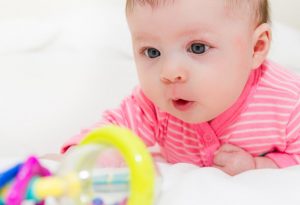
- Your baby begins to learn to change his position in order to be able to reach things better.
- Your baby may seem wobbly at first but now is when your baby will have learnt to stand without any support.
- “Cruising” is the term that is used to refer to a baby learning to walk by using other objects for support.
- Babies of this age will not make much progress when it comes to climbing all the stairs, but they will manage to scale a few given enough time.
- At this point, your baby has developed better motor and muscle capacity and now has a better grip on objects.
Cognitive Development
Here are the cognitive developments your child should have made by 11 months:
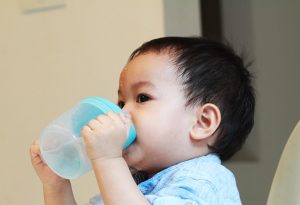
- At this age, babies are beginning to learn the names of the people and objects they interact with on a regular basis.
- Babies are developing their spatial skills at this point. This is where they learn to observe the shapes and sizes of objects and then manipulate them.
- Your little one begins to understand how to use his cup, lifting it to his mouth to drink. He may also start to lift the comb directly to his head if he sees it. He is learning how things work.
- Your baby will now be able to communicate his disapproval towards certain things like if he is not enjoying a meal, he will show it by shaking his head in order to say “No”.
Social and Emotional Development
Here are the milestones to look out for in your child related to his social and emotional development:
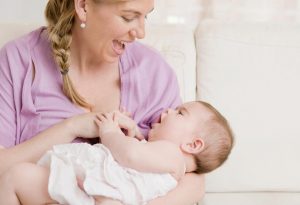
- Your baby now exclusively knows who mama is and who dada is and will even know whom he needs depending on the situation.
- If put in a situation where a baby has to interact with a lot of people, he will naturally go freely to the people he knows, often giving them warm smiles. With people he doesn’t know, he may show nervousness and unwillingness to leave the familiar person he is with.
- Your baby will now display a wide range of emotions. He knows how to express his displeasure, throwing a tantrum when he does not like the situation he is in or the outcome of an action, like taking away his toys to put him to bed.
- Babies of this age will usually engage in parallel play; this is when they play alongside but not with another child.
Communication Skills
Here are some communication skills your baby is developing at this age:
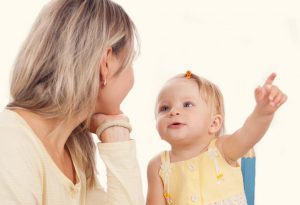
- Your baby will learn to indicate his wants through his actions.
- At this age, babies may show an interest in a two-way conversation.
- Your baby can now follow a number of actions and may even try imitating some expressions and words from you and your partner.
- Your baby can now follow simple requests such as “Could you please give me that block?”
Eating Milestones
Some eating milestones that your baby will reach this age are:
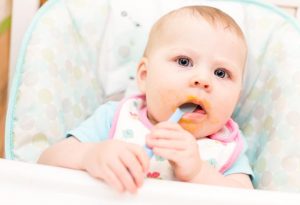
- Your baby will start feeding himself with his fingers and will also start to experiment with a spoon.
- By this time, his sense of taste will start developing.
- He may begin eating a more varied diet of pureed or mashed solid foods.
- Some fussy eaters may not want to eat new food that is offered to them. Try offering it to them at least eight to twelve times before they get used to it.
When to be Worried
Here are some things to watch for during your baby’s development:
- At this age, babies should be able to stand and at least attempt their first steps. So if your baby still hasn’t begun to crawl at all, you may want to visit your doctor.
- Babies are fast learners, and if you help them out at this age, they will eventually get the hang of standing. However, if you notice that your child’s legs look loose and shaky when he stands or is not able to stand even with support, consult your doctor.
- Babies by this age start babbling and try to imitate what you say. If your baby does not utter a single word, then you may need to get your baby checked by a doctor.
- If you call out to your baby from behind a closed door, your baby will immediately turn towards the sound of your voice, even if he cannot see you, and since he knows you are there, he will keep looking at it. This requires all the baby’s senses to be working in harmony. If your baby seems confused, his sensory functioning may be poor, which is a bad sign.
Ways to Help Your Child Reach the Milestones
Help your baby reach his 11-month-old baby development milestones with a few simple steps:
- Play with him in a way that enables him to practice and develop his new skills and take him to a park to socialise.
- Help your baby be independent by allowing him to comb his own hair if he likes to, or by letting him feed himself.
- Read to your baby with the help of simple storybooks with colourful pictures. Your baby may try to say the name of a familiar picture you point to in his books. This helps in developing memory and speech.
- Your little one can link words and actions by now, and it is important to start to cut baby talk out of your conversations. This will help to improve and grow your baby’s basic vocabulary.
Always remember that each baby will reach these milestones at the rate they are comfortable in. As long as it doesn’t match up to any of the signs to be worried about, all you need to do is keep going for your regular doctor’s appointments and help your baby out through your simple everyday activities.
Previous Month: 10 Months Old Baby Milestones
Next Month: 12 Months Old Baby Milestones









